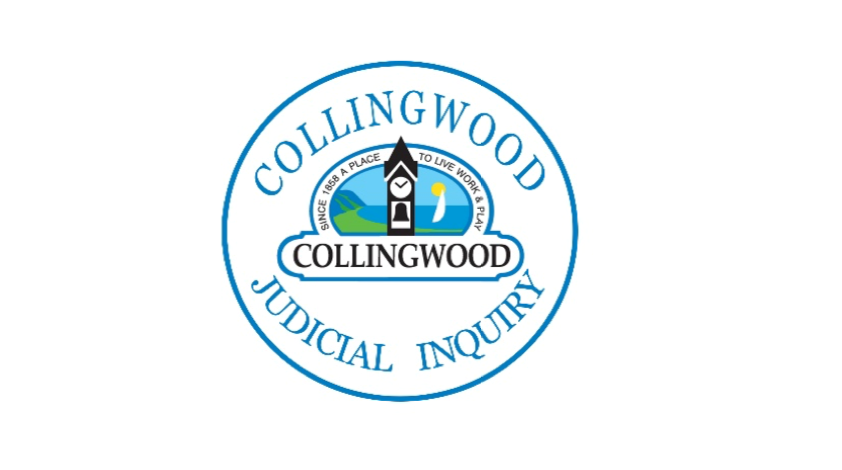The Collingwood Judicial Inquiry wrapped up the first phase of hearings today, but work will continue through the summer to prepare for the second phase.
“I’m very pleased with how the first phase of the hearings have gone,” said Kate McGrann, the lead counsel for the inquiry. “I think all the participants have contributed to an efficient hearing … and I think the team has worked well together. I think we’ve heard evidence on the issues the inquiry needed to hear.”
The Collingwood Judicial Inquiry was called by council in February 2018 to look into the sale of 50 per cent of Collingwood Utilities Services Corporation to PowerStream in 2012, and the subsequent decisions made to spend the proceeds of the sale.
The inquiry has been divided into three phases.
The first phase dealt with the sequence of events leading to the transaction, including the corporate relationships and the impact of the share sale.
Hearings concluded today (June 28) with testimony from former councillor Kevin Lloyd.
Part two will consider the sequence of events leading to the allocation of the proceeds, the payment of fees or benefits and the impact of the construction of Central Park Arena and Centennial Aquatic Centre. Both were built using proceeds from the share sale.
Part three is a policy phase, and will include testimony from “subject-matter experts,” whose presentations are meant to provide information to Associate Chief Justice Frank Marrocco for his final report and recommendations.
McGrann said the final phase will include experts in municipal governance and functioning.
Public hearings for phase two will commence Sept. 9, but there’s no summer break for those working on the inquiry.
During the month of July, inquiry counsel will be writing and preparing a second foundation document, which is a chronology of events and references/links to documents submitted as evidence.
The first foundation document was more than 300 pages not including the documents linked in the text. It was referenced frequently by inquiry counsel and the participants through witness examination.
“The use of the foundation document has proven to be very effective,” said McGrann. “I think it’s helped us move through the evidence in an understandable way. It’s helped us to organize ourselves.”
The Collingwood Judicial Inquiry received more than 440,000 documents from several parties “which is a lot for us as professionals," said McGrann. "It would be a lot for the participants to wade through without some organization, and I think it would be impossible for members of the public to work with that kind of information."
Once the second foundation document is written, it will be sent to all the participants in phase two for comments before being released to the public.
Marrocco estimated the document would be sent to participants by mid August.
The foundation documents are not completely unique, but the Collingwood inquiry has resulted in a much larger number of documents than is common for inquiries.
Elliott Lake’s inquiry into the mall roof collapse included 1,000 documents.
“Other inquiries have provided summaries, but I believe this is the first time that a document of this nature - comprehensive in terms of the material relevant documents we were able to identify - was released to the public in advance of the hearings,” said McGrann.
The original cost of the Collingwood Judicial Hearing was estimated around $1.6 million for the town. Updated estimates suggest the inquiry will cost the town closer to $4 million.
A schedule posted prior to the start of hearings estimated all three phases would be complete by the end of June, 2019, but was soon edited to indicate it would be just phase one complete by the end of June.
“The inquiry is a process that sort of changes over time,” said McGrann. “At the time the dates were set, there was some information available and by the time we got to the dates of the hearing, there was more,” said McGrann.
“Inquiry staff and Justice Marrocco have taken the steps that we need to take in order to answer the questions that have been asked, and that includes extending the schedule to hear from witnesses that we needed to hear from.”
The inquiry was called by Collingwood council nearly six years after the sale was complete, by a council vote of 5-1. At the time, former mayor Sandra Cooper voted against the motion, and councillors Kevin Lloyd, Mike Edwards, and Tim Fryer were absent from the meeting so did not cast a vote.
“We’ve been asked to answer specific questions,” said McGrann. “So the way the inquiry has unfolded is a function of both the questions that were asked and the information that was available.”
In the end, Justice Marrocco will deliver a report that seeks to answer those questions posed in the terms of reference set by council when the inquiry was called. He will also make recommendations for the town’s future.
“To the extent that those questions have been outstanding, that particular issue should be put to rest by the report,” said McGrann.
Documents, notices, and transcripts are posted online regularly to the Collingwood Judicial Inquiry website.
